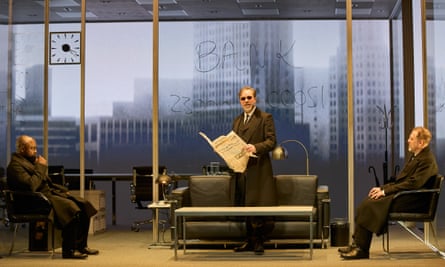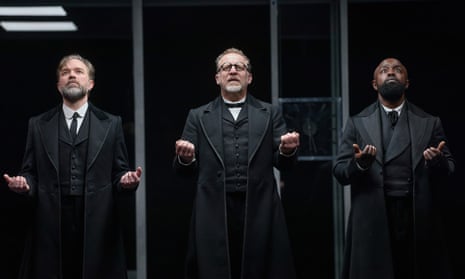The Lehman Trilogy premiered in Europe just five years after the eponymous bank’s collapse and then arrived at London’s National Theatre a decade on from the financial earthquake of 2008. (Broadway, and five Tony awards, followed.)
There is power in being reminded of the reckless opportunism and avarice that led up to that moment. Stefano Massini’s drama, adapted by Ben Power, shows this through the extraordinary trajectory of the Lehman brothers, Henry, Emanuel and Mayer, 19th-century Bavarian Jewish immigrants who become Alabama shopkeepers, cotton brokers and finally magnates at the helm of one of the largest banks in the US.
Directed by Sam Mendes, this is a handsome, playful and sometimes sublime production in which dynastic history collides with world events to show the end point of America’s rugged individualism. It shows how the brothers’ capitalist entrepreneurship is built on human exploitation – they trade with southern slave plantations for their cotton, then in war ammunition and tobacco, their capitalist dream evidently made on the repackaging of misery.
Its theatricality is utterly astonishing. Michael Balogun, Hadley Fraser and Nigel Lindsay not only perform as each brother but also as sons, wives and grandchildren, each actor excellent in their parts. Es Devlin’s gorgeous glass and chrome boardroom set design rotates in front of a cinematic screen charting changes of time and place (from 18th-century views of the Hudson river to Manhattan’s modern skyline).

But it can feel indulgent in its emphatic repetitions, set against Yshani Perinpanayagam’s piano music and Philip Glass-like sounds. The humour, sharp and delightful for the main, becomes a little too cutesy in some picaresque scenes and the brothers as a whole seem drawn with a kind of cuddly admiration that somewhat lets them off the hook.
The pace quickens after the last brother dies and there is a mystifying glaze over even the basic details leading to the bank’s collapse. This is bizarre, given the length of the play and how long is spent on the fallout of the Great Depression. It is all the more of an omission now, given dramas such as Industry, which have done a fine job of dramatising the inner machinations of banking. It speeds over any mention of 9/11 which seems remiss given the prominent New York City backdrop and that we are told, emphatically, how Henry Lehman landed in New York on 11 September 1844.
The production grows more charged when the tone becomes savage, with boardroom talk of how to get people to buy things they don’t want, with money they don’t have. But as accomplished and aesthetically arresting as the production is, it bobs a little too lightly along the surface of its subject matter.
At the Gillian Lynne theatre, London, until 20 May.

Comments (…)
Sign in or create your Guardian account to join the discussion